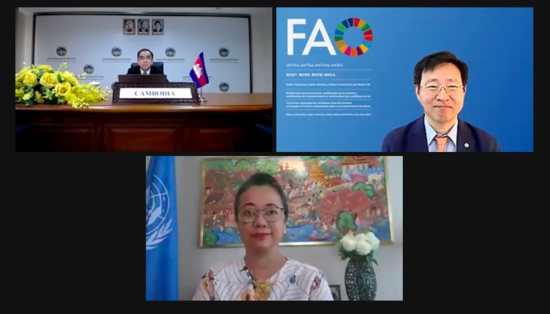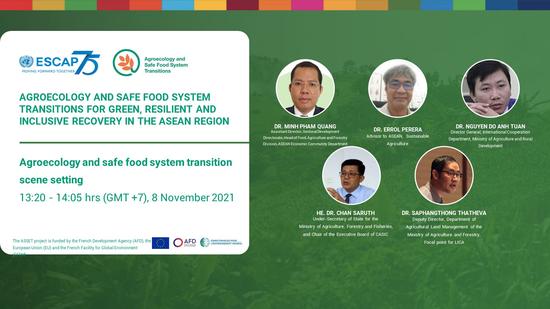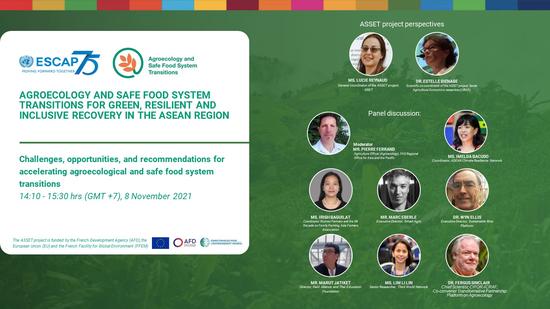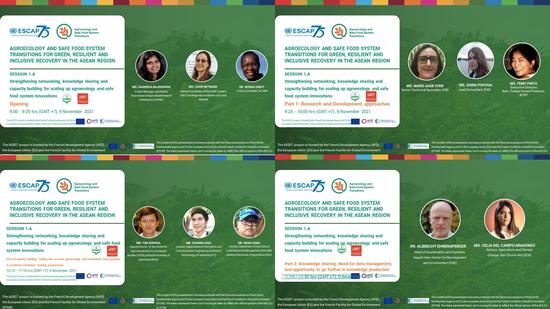Workshop on Agroecology and Safe Food System Transitions for a green, inclusive and resilient recovery in the ASEAN region – 8-9 November 2021
The ASEAN Vision and Strategic Plan for Food Agriculture and Forestry 2016 - 2025 is a “competitive, inclusive, resilient and sustainable food agriculture and forestry sector, integrated with the global economy, based on a single market and production base contributing to food and nutrition security and prosperity in the ASEAN Community.” Collaboration between government and research institutes, development partners and the private sector are envisaged to play important roles in achieving this vision. In response, UN ESCAP and other ASSET project partners teamed-up to convene a multi-stakeholder virtual event to discuss the requirements for transition to agroecology and safe food systems. The workshop discussions were targeting in particular to contribute to the current initiative to produce ASEAN guidelines on sustainable agriculture, as provided under the ASEAN Comprehensive Recovery Framework and Implementation Plan and to strengthen the Lao PDR-facilitated Initiative on Agroecology for the ASEAN (LICA) process.
The workshop was attended by over 120 Government officials from ASEAN member states (in particular active ASSET project hosts and partners), LICA focal points, members of the ALISEA network, ASSET partners and partner networks, and other representatives of relevant civil society organizations, farmers’ organizations, research institutions and the private sector.
The discussions of the first afternoon highlighted that there is building momentum around agroecology and sustainable agriculture as strategic avenues – although nascent and facing complex challenges. Development partnerships and networks are making a difference and having policy impact. Welcome and opening addresses by Ms. Armida Salsiah Alisjahbana, Under-Secretary General of the United Nations and Executive Secretary, ESCAP, Mr. Jong-Jin Kim, Assistant Director-General and FAO Regional Representative for Asia and the Pacific provided important institutional and global perspectives. The keynote address by H.E. Mr. Veng Sakhon, Minister, Ministry of Agriculture, Forestry and Fisheries, Cambodia, highlighted the important role played by CASIC in shaping the national agenda and bringing stakeholders, including the private sector together.
The scene for agroecology transition and multilateral collaboration was set by Dr. Minh Pham Quang, Assistant Director, Sectoral Development Directorate, Head of Food, Agriculture and Forestry Division, ASEAN Economic Community Department and Dr. Errol Perera, Advisor to ASEAN on Sustainable Agriculture; Dr. Nguyen Do Anh Tuan, Director General, International Cooperation Department, Ministry of Agriculture and Rural Development; H.E. Dr. Chan Saruth, Under-Secretary of State for the Ministry of Agriculture, Forestry and Fisheries, and Chair of the Executive Board of CASIC and Dr. Saphangthong Thatheva, Deputy Director, Department of Agricultural Land Management of the Ministry of Agriculture and Forestry, Focal Point for LICA.
Following a presentation on ASSET project perspectives by Ms. Lucie Reynaud, General coordinator, ASSET project and Regional Coordinator of ALiSEA Network, Group for Research and Technology Exchange (GRET) and Dr. Estelle Biénabe, Scientific Co-coordinator, ASSET project (CIRAD) and Co-chair of the organizing committee of the event, an expert and stakeholder panel moderated by Mr. Pierre Ferrand, Agricultural Officer (Agroecology) of FAO shared additional critical insights. Key messages highlighted in the wrap up by Katinka Weinberger, Chief of the Environment and Development Policy Section of ESCAP, included the need to establish a business model for agroecology, ensure farmers voices, support localization and adaptation by focusing on principles, address the incentives for monoculture and industrial agriculture, and look at food safety and impacts on vulnerable groups. The importance of partnerships for establishing normative and monitoring frameworks was also highlighted. Importantly for the ASSET project, the need to integrate policy processes from “bottom” to “top” levels was highlighted, along with the need to re-balance the power dynamics of knowledge production. The example of the Climate Resilience Network in bringing ASEAN governments together to negotiate as a group and the impacts of the Supply Rice Platform provided a good example of the power of effective coordination and collaboration.
Day 2 was led by DALaM (Lao PDR), CIRAD, FAO, GRET, APAARI, the Center for Development and Environment (CDE) at the University of Berne and Swisscontact. Four sessions focused on ASSET project streams and the challenge of climate action, monitoring and financing and provided important insights for moving forward on each project stream and featured national and regional ASSET partner institutions and wider network affiliates. These “deep dives” provided unique opportunities for discussion and revealed the important advances being made. The organizing committee then reviewed the insights shared to make them available more broadly.
Recordings for the meeting, presentations and other workshop information have been shared HERE.
Published: 20/11/2021




